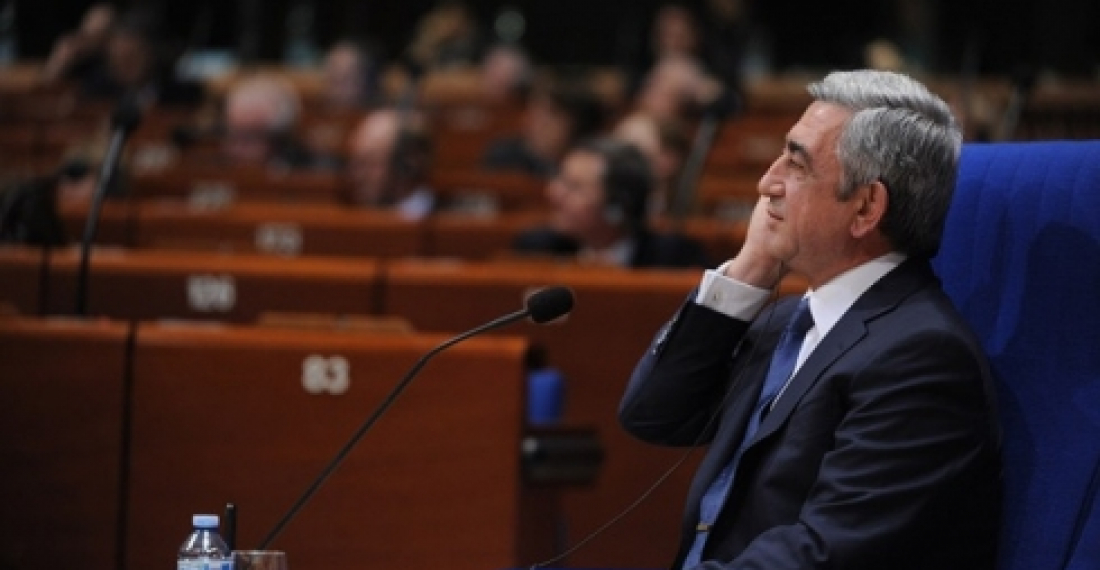The Parliamentary Assembly of the Council of Europe is an elevated talking shop where parliamentarians who no longer asspire for high office are often sent to share their wisdom with their colleagues, and keep out of mischief. It is by and large a sedate place but has in the past done useful work in the field of human rights and culture. Yesterday however it got a doze of a more earnest type of politics. The guest was the president of Armenia, Serzh Sargsyan, whose country currently holds the chairmanship of the Committee of Ministers of the Council of Europe.
Sargsyan wanted to use the platform to do several things: first of all re-assure parliamentariuans that Armenia was not abandoning Europe; secondly use the opportunity to score some points against Azerbaijan; third try to rally support for big Armenian issues such as the genocide.
He told the assembled MPs, that
"Armenia today is a country of free speech and free media. We safeguard the freedom of assembly; civil society is vibrant and aware of its rights and ways to uphold them."
On relations with Europe, Sargsyan said:
"The European Union is one of Armenia's most vital partners. Wide-scale reforms in the areas of human rights, democracy, and the rule of law make up the core of the Armenia-EU relationship. The Eastern Partnership Instrument created under the EU Eastern Partnership program in cooperation with the Council of Europe is an important initiative covering a variety of activities in the participating states related to elections, judicial reform, good governance, fight against corruption and cyber-crime.
There has recently been much talk about the civilizational choice of the countries-members of the Eastern Partnership initiative. We have always stated that we don't believe it is right to view the issue in that dimension. Armenia aims to continue its comprehensive, mutually beneficial partnership with the EU. From the outset of the Eastern Partnership initiative and even before, we have stated and continue to state that we aspire to have the closest possible and widest possible relations with the EU, and to be close to the EU. This policy will not be terminated.
As is known, Armenia has a close allied relationship with Russia. Armenia is not building new relationships at the expense of the relationship with her strategic ally; in the same vein, we will not build relationships with other partner, which might be aimed against our other partners. We will continue to develop in parallel relationships and interests with our key partners."
On relations with Azerbaijan and Nagorno-Karabakh the Armenian leader said,
"Peaceful resolution of the Nagorno-Karabakh issue under the aegis of the OSCE Minsk Group Co-Chairmanship has been and will remain our priority until we achieve a comprehensive settlement. We value the efforts of all those who support regional stability, but we also know that we must rely primarily on our own power to deter the opponent against possible negative developments and to maintain peace, especially as the leader of our neighboring state continues to make public statements threatening with war, declaring the Armenians his "enemy number one", boasting about disproportionate increases in military spending, and the buildup of arms.
Nonetheless, I hope that the people of Azerbaijan or their significant part actually do not share this mindset. Unfortunately, those in Azerbaijan who are trying to bring up candid memories of the past, which was once shared with the Armenian people, are being publicly admonished, threatened "to have their ears cut," and expelled from the country. Hence, the actual mood of the people of Azerbaijan is not articulated and whatever is voiced is demanded by the propaganda machine. It results in the ineffectiveness of any attempt to implement confidence-building measures.
I am confident that our peoples will have a better future than the one contemplated by some leaders who preach hatred and war. As I have already stated publicly on other occasions, I do not consider the people of Azerbaijan to be the enemy of the Armenian people. We are capable of respectfully resolving our disagreements and peacefully co-existing as neighbors."
It was on the whole a polished performance, but things got stickier when the time came for MPs to ask questions. Sargsyan was challenged by the Azerbaijani delegation about Armenia's continued occupation of Azerbaijani territory. His reply that if Azerbaijan tried to regain its territories by force it will end up with even more of its territory under occupation would have scored points in Yerevan, hardly any in Strasbourg. Than an Armenian MP stood up to say that Sargsyan had lost Euros 70 million gambling in a Casino in Europe. Sargsyan said that he did not have Euros 70 million, and had never been in a Casino anyway. And so it went on. As the session ended and the many aged amongst the MPs walked out of the Parliament Chamber one could observe a glimmer in their eye. The session had reminded them of some of their own experiences of cut-throat politics in distant days. But they had never seen anything like this.
Back in the region the spokespersons of the Azerbaijani Ministries of Defence and Foreign Affairs weighed in with blood-thirsty statements about Sargsyan's speech, accusing Sargsyan of being personally responsible for war crimes.
Yesterday, the Parliamentary Assembly of the Council of Europe got a taste of politics in the Caucasus. It was a good reminder of how careful it has to be when dealing with the affairs of the region.
source: commonspace.eu
The full speech of President Sargsyan to the Parliamentary Assembly of the Council of Europe in Strasbour is available to read in full on the website of the president of Armenia
Photo: The President of Armenia speaking in Strasbour on 2 october 2013 (picture courtesy of the Press Service of the President of Armenia)







